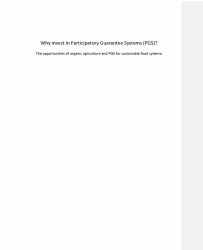Consumers in the Asian Region are demanding more nutritious and safe food due to rapid urbanization, growing middle-class, increased per capita income, and food contamination scandals (FAO, 2009a; Ong, 2016). This represent new market opportunities and challenges for organic farmers. Having access to stable and premium markets translate into better incomes and livelihoods for smallholder farmer while supplying fresh and locally produced safe food to consumers. Between the challenges the smallholder organic farmers face, there is the lack of capacity to differentiate their organic products from the conventional ones and profit from this income-gaining opportunities in the organic market.
Organic agriculture contributes to the development of local sustainable food systems, in particular through Participatory Guarantee Systems (PGS), which are important institutional innovations addressing the specific needs of smallholders, local markets and their communities. PGS provide an alternative for organic certification based on trust, social interaction and peer-reviews. Such systems rely primarily on the personal relationships that are established between farmers, customers, local advisors or buyers (FAO and IFOAM, 2013) and are more widely accepted in local markets or short supply chains.
In 2013, FAO and IFOAM – Organics International jointly organized the Asia Pacific Symposium on Entrepreneurship and Innovation in Organic Farming. During this event participating countries from the Asian region requested technical assistance for the establishment and promotion of PGS) as a low-cost quality assurance for smallholder farmers practicing organic agriculture to gain access to the emerging organic markets in the region.
In response, in 2015 a pilot project funded through the Food and Agriculture Organization of the United Nations (FAO) Technical Cooperation Programme (TCP) titled Small-Scale Farmer Inclusion in Organic Agriculture Development through Participatory Guarantee Systems (PGS) started in Lao People’s Democratic Republic (Lao PDR) and Cambodia. The TCP project targeted the certification and marketing issues through the promotion of PGS in the participating countries.
This publication will present the opportunities and limitations of PGS as a tool for transiting towards sustainable local food systems through:
- the creation of agri-business opportunities in rural and urban areas,
- empowerment of smallholders farmers and local communities,
- making organic food available and accessible at local markets.
The publication aim to raise awareness on PGS between governments, local authorities, developing partners, donors, small and medium entrepreneurs (SMEs) and local Non-government organisation (NGO) to incentivize its investment. This publication brings together the information gathered during the project implementation based on face-to-face interviews with various stakeholders, field observation and national and regional multi-stakeholder meetings.

